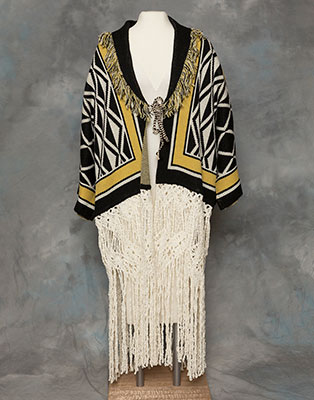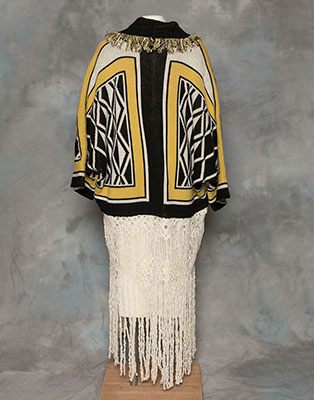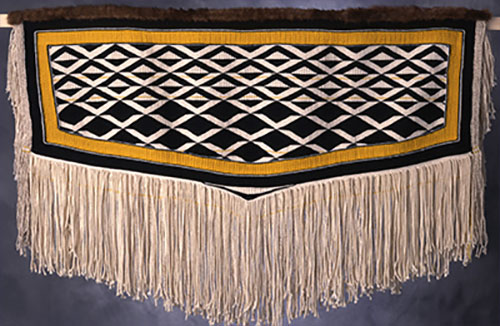
Sealaska Heritage Sues Neiman Marcus Alleging Unlawful Use of Term "Ravenstail" Copyright InfringementInstitute seeks injunction, compensation for damages
April 27, 2020
In the lawsuit, SHI is asking for an injunction against Neiman Marcus and its parent companies prohibiting them from selling the piece, which they are marketing as a “Ravenstail Knitted Coat” (right) and selling for more than $2,500. The institute is seeking statutory, compensatory, punitive and other damages. Any funds derived from the lawsuit will be shared with the family that owns the copyright to the Ravenstail robe from which the design was taken and invested in an arts and culture endowment. The lawsuit was filed today in the U.S. District Court for the District of Alaska. Prior to SHI filing the lawsuit, Neiman Marcus was made aware of the issues with their product but failed to take any action. Through the lawsuit, SHI is telling the world that the sale of ancient art practices through people other than Native artists will not be tolerated, said SHI President Rosita Worl. “In our opinion, this retail garment looks like a Ravenstail robe, and it features a replica of a design that is protected by copyright. It’s one of the most blatant examples of cultural appropriation and copyright infringement that I’ve ever seen,” Worl alleged. “The unlawful taking of Indigenous intellectual property has to stop,” she alleged. The lawsuit accuses Neiman Marcus of violating the Indian Arts and Crafts Act (IACA), a federal law enacted in 1935 to ensure that products marketed and sold as “Indian” are actually made by Native Americans or Alaska Natives. The complaint stems from the company’s use of the term “Ravenstail.”? Ravenstail weaving is a unique, intricate and highly complex geometric art style invented by Native people of the northern Northwest Coast. Existing written and traditional evidence supports the manufacture and use of Ravenstail robes by the Tlingit, and the use of blankets in this weaving style by the Haida, Tsimshian and Sugpiaq/Alutiiq tribes. Contemporary weavers of these tribes, such as Haida weaver Evelyn Vanderhoop, also highlight the claim to this weaving tradition based on oral history passed down from generation to generation. The oldest example of Ravenstail weaving was excavated by Frederica de Laguna, an ethnologist, anthropologist, and archaeologist, and Francis Riddel in Yakutat Bay, Alaska, according to the book “Native Art: Tradition, Innovation, Continuity” by Susan Fair. In the book, de Laguna is quoted as saying Ravenstail blankets were being made by the northern Tlingit in the late 18th century. The term “Ravenstail” has been exclusively associated with the material culture of the Tlingit, Haida, and Tsimshian for hundreds of years, and the defendants’ use of the famous and distinctive Ravenstail term in connection with the sale of its coat falsely suggests the product originated from the Tlingit, Haida, and Tsimshian, the lawsuit alleges. “The use of the term ‘Ravenstail’ implies it came from northern Northwest Coast tribal people,” Worl alleged.
The copyright infringement allegation ties to a specific Ravenstail robe created in 1996 by the late master weaver Clarissa Rizal, who was named a National Heritage Fellow by the National Endowment for the Arts, the country’s highest honor in traditional arts. The rights to the robe, “Discovering the Angles of an Electrified Heart,” (right) were passed to Rizal’s heirs upon her death in 2016. Her heirs registered the work with the U.S. Copyright Office in 2019 and exclusively licensed it to SHI. SHI discovered in late 2019 that Neiman Marcus was selling a direct copy of Rizal’s robe titled “Ravenstail Knitted Coat,” which is a violation of the piece’s copyright protections, according to the claim. The case is thought to be the first time an entity has been sued in the United States for copyright protection of a traditional pattern, said SHI’s attorney, Jacob Adams. “In that respect, the case is groundbreaking,” said Adams, who specializes in the protection of Indigenous intellectual property.
Edited By Mary Kauffman, SitNews
Source of News:
|
|||||


